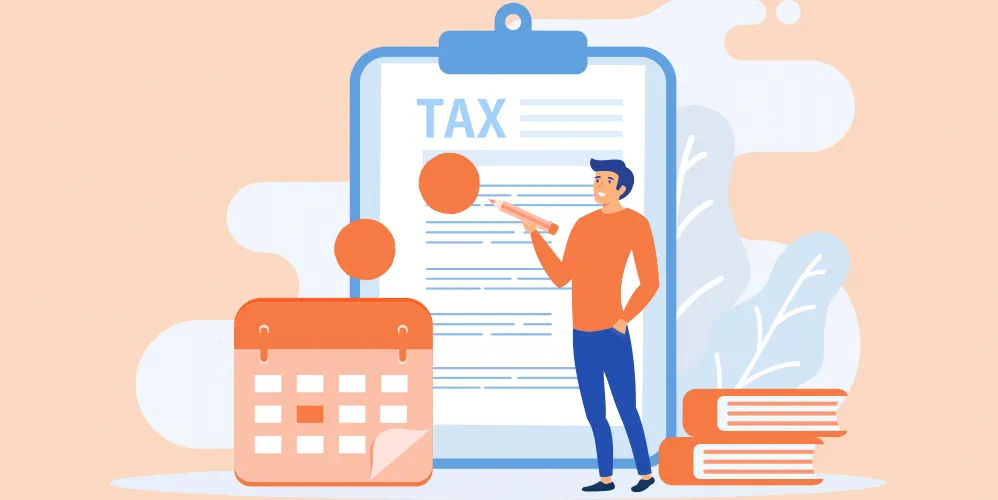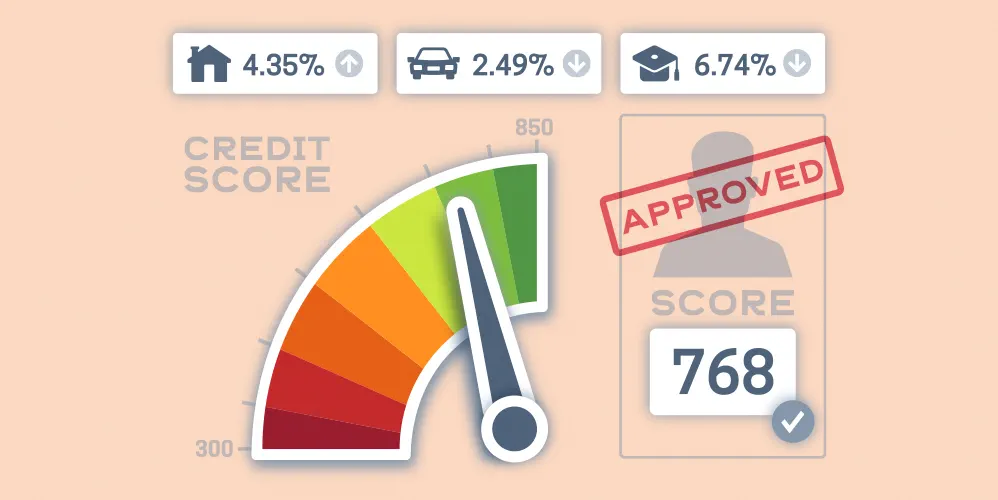
The Different Types of Loans Available in India
13 Feb 2023

Table of Content
Loans are essentially capital borrowed from a bank or a financial institution. These institutions charge interest against lending money for a certain definite period. For some, bank loans are a way to meet emergencies while for others, loans act as a catalyst for growth. It all depends upon the purpose and the type of loans that the borrowers have availed. Various types of bank loans are available that a borrower can access. Here are the different types of loans that borrowers can avail of from lending institutions.
Different Types of Loans in India
Following are the different types of bank loans in India that are provided by the banks and financial institutions:
Secured Loans
Secured loans are those loans that are provided against security. The borrowers need to furnish security for availing of secured loans. In the case of secured loans, lenders face a lower risk of default by the borrower. In case the borrower is unable to repay the loan, then the lender can sell the asset to recover its dues. This is the main reason why secured loans carry a lower interest rate than unsecured loans.
Unsecured Loans
These are the exact opposite of secured loans. Unsecured loans are provided against the income or the prospective income-earning capacity of the borrower. Regarding unsecured loans, the borrowers are not required to furnish any security. The lenders extend unsecured loans based on the documents provided by the borrower, their income potential, and their CIBIL history. Unsecured loans increase the risks of the lender because, in case of default by the borrower, there is no security available with the lender from which it can recover its dues. This is the reason why lending institutions charge a higher interest rate for unsecured loans.
RELATED: Difference Between Secured and Unsecured Loans
Types of Secured Loans
Following are the different types of secured loans that borrowers can avail of from the lending institutions:
Home Loans
These are the most common types of secured loans availed of by borrowers. As the name suggests, home loans are taken for the purchase or construction of a home by the borrower. Here, the home itself acts as a security for the lender. However, while the home is the primary security, the lender may require the borrower to furnish collateral security as well depending upon the borrower’s profile and the valuation of the home. This can either be a fixed deposit or any other asset. Home loans are long-term loans and the loan tenure can range from 10 years to as long as 25 years. They are usually high-ticket loans running into lakhs and also the most affordable ones. The home loan interest rates start anywhere between 7% per annum to 7.5% per annum. The loan needs to be repaid in Equated Monthly Installment (EMIs). The Loan-to-Value (LTV) ratio is usually 80%. It means, the borrower can avail of a loan up to 80% of the property value.
RELATED: A Guide to Home Loan
Gold Loans
Gold loans are taken against the gold owned by the borrowers. Here, gold acts as a security for the lender whereby the borrower can pledge the gold with the lender and avail of money from them. The lender retains possession of the gold until the loan is repaid. The gold loan interest rate starts from 7.50% per annum. Here, most lenders require the borrowers to pay only the interest on the loan amount each month. The principal can be repaid by the borrowers anytime, and they can take back the possession of the gold. Till the principal is repaid, interest needs to be paid each month on the outstanding principal. Further, the LTV on gold loans can go up to 90%.
Gold Loans
Gold loans are taken against the gold owned by the borrowers. Here, gold acts as a security for the lender whereby the borrower can pledge the gold with the lender and avail of money from them. The lender retains possession of the gold until the loan is repaid. The gold loan interest rate starts from 7.50% per annum. Here, most lenders require the borrowers to pay only the interest on the loan amount each month. The principal can be repaid by the borrowers anytime, and they can take back the possession of the gold. Till the principal is repaid, interest needs to be paid each month on the outstanding principal. Further, the LTV on gold loans can go up to 90%.
RELATED: A Complete Guide to Gold Loans in India
Vehicle Loans
These are the loans taken for the purchase of the vehicle. Vehicles can include both passenger and commercial vehicles as well as two-wheelers, four-wheelers and heavy vehicles. Here, the vehicle acts as a primary security for the lender. In the event of non-repayment, the lender can seize the vehicle. The interest rate on vehicle loans can start anywhere between 7% per annum to 7.5% per annum. The LTV depends upon the type of vehicle. For certain vehicle loans , the lender can even offer a loan of up to 100% of the vehicle’s value.
Loan Against Property
This is a kind of mortgage loan whereby the borrowers can avail of funds by mortgaging their property with the lender. Loan against property can be availed of against both residential and commercial property. The administration charges for loans against property are higher than for home loans. The funds can be used by the lender for either business or personal purposes. The LTV in case of a loan against property can be anywhere between 65% to 70%. Further, the interest rates on loans against property are also slightly higher as compared to those on home loans. The interest rate here starts from 8% per annum.
Loan Against Securities
Investors often invest in shares and securities. This can include shares, mutual funds, bonds and debentures. The investors are eligible to borrow money from banks and financial institutions against these securities. However, as the securities are volatile in nature, LTV for loans against securities is 50% of the security value. This is to protect the lender against any downside risk due to a fall in the value of the security. Further, the interest rate in the case of loans against securities also varies depending upon the type of security. It can start anywhere between 7.50% per annum.
Title Loans
In title loans, the lender provides loans to the borrowers against their vehicle. Here, the borrowers can borrow up to 25% to 50% of the value of their vehicle by handing over their vehicles as collateral security to the lenders. While the possession of the vehicle remains with the borrower, in case of default, the lender may seize the vehicle. These loans are usually ultra-short-term loans and can be taken for as short a period as 30 days. One of the major drawbacks of title loans is that the interest rate is very high. The interest rate is usually 25% per month. That means it's 300% per annum.
Non-recourse Loans
Non-recourse loans are the type of secured loans whereby the borrowers can provide collateral security to the lender for borrowing the funds. In case of default by the borrower, the lender has the right to seize the collateral security. However, one of the key features of a non-recourse loan is that the lender cannot proceed against the borrower if the collateral security does not provide full compensation to the lender. Thus, the lender shall forgo the remaining amount of the loan after recovery from the collateral security. The borrower does not have any personal liability to repay the non-recourse loan. The LTV in the case of a non-recourse loan can be anywhere between 60% to 80%.
Loan Against Fixed Deposits
Here, banks and financial institutions provide loans to borrowers against fixed deposits. The fixed deposits act as primary security for the lender. Further, as the fixed deposit is equivalent to money, banks do not face many risks in the case of loans against FD. Borrowers can avail of loans against FD for an amount up to 60% to 75% of the FD value. In terms of interest rates, while some banks charge a flat interest rate, other banks may charge interest that is 1%-2% rate higher than the FD rate. Currently, the FD rate is anywhere between 5% to 7.5% per annum, depending upon the amount and tenure. Thus, it can be said that loans against FD are one of the most affordable secured loans.
Loan Against Insurance
Loans against insurance are also one of the popular secured loans in India. Many people have life insurance policies but seldom do they know that policies can act as a security against which money can be borrowed. To avail of a loan against an insurance policy, the policy must have a surrender value. The LTV in case of loan against insurance is anywhere between 85% to 90% per annum. The interest rate in this case can start anywhere between 10% per annum to 12% per annum.
Working Capital Loans
Working capital loans are extended by banks and financial institutions to help businesses meet their working capital needs. Also known as Cash Credit, here the amount of loan that can be availed of depends upon the creditors, debtors and stock that the business holds which also constitutes the working capital for the business. Each lending institution has its own way of calculating the working capital limit. Further, the interest rate on working capital loans can start from 12% per annum. While the stock and debtors act as a security in the case of working capital loans, the lending institution may require the borrower to furnish collateral security as well.
Types of Unsecured Loans
Following are the different types of unsecured loans that borrowers can avail of from the lending institutions:
Personal Loans
These are one of the most sought-after bank loans in India. Personal loans are loans extended by banks or financial institutions without any collateral security. It is essentially a loan against the income of the borrower. The key features of personal loans are that it does not require any collateral security, and there is no restriction as to the end use of the borrowed funds. The borrower can utilise the amount borrowed for any purpose, be it medical emergencies, marriage, education of the children, purchasing any asset or travelling. The amount of personal loan that a borrower can avail of depends upon the income of the borrower and his/her CIBIL score. Further, the rates of interest on personal loans can range anywhere from 8% per annum to 10% per annum.
RELATED: A Complete Guide to Personal Loan
Short-term Business Loans
Uncertainties can strike the business anytime. In case a business is facing a financial crunch, then it can go for short-term business loans. These bank loans are structured to help businesses meet short-term uncertainties and financial crises. The eligibility criteria are simple, and the amount of loan that can be disbursed depends upon the profitability of the business and the profile of the borrower. The interest rates for short-term business loans can be anywhere between 1% and 1.5% per month, i.e., 12% to 18% per annum. The reason that business loans attract a higher interest rate than personal loans is that there is a chance of loss of borrowed funds in the business. In such cases, the risk falls on the shoulders of the lenders.
Education Loans
The cost of education is rising at a rapid pace. If one wants to pursue quality education, then he/she needs to shell out lakhs of rupees. In such cases, an education loan provides monetary assistance. The interest rate on education loans can start from 8.85% per annum, and the amount of the loan depends upon the cost of education. The repayment for education loans usually begins 12 months after completion of the education.
Credit Cards
Many banks offer credit cards . These are great tools as one gets to spend using the credit card without actual cash outflow. The grace period provides the time for repayment to the credit card holder. However, credit cards are unsecured in nature. Further, they come with an option to convert the outstanding balance to a loan if the credit card holder requires it. This becomes an unsecured loan for the borrower. One of the major drawbacks of credit card is that it attracts a very high interest rate. The credit card interest rate can be anywhere between 18% and 36% per annum. Further, like any other loan, credit cards also have a great impact on the CIBIL score .
Avail of Instant Loans from BOB
Bank of Baroda is one of the oldest and most renowned banking institutions that provides secured and unsecured loans against all categories. It is one of the premier loan companies in India where one can avail of different types of loans from BOB at some of the most affordable rates and charges. Following are the eligibility criteria and interest rates for different loans at BOB:
|
Type of Loans |
Eligibility Criteria |
Interest Rates |
||||||||||
|---|---|---|---|---|---|---|---|---|---|---|---|---|
|
Secured Loans |
||||||||||||
|
Home Loans |
|
Starting from 8.25% per annum |
||||||||||
|
Gold Loans |
|
Starting from 9.75% per annum |
||||||||||
|
Vehicle Loans – Car Loan |
For other borrowers:
|
Starting from 8.50% per annum |
||||||||||
|
Vehicle Loans – Two-wheeler Loan |
The loan can be availed of by salaried employees, businessmen, farmers, professionals, staff or ex-staff Purpose: For buying a new two-wheeler for personal use Eligibility based on income criteria For salaried employees: Average of last 3 months' gross monthly income For others: Average of the past 2 years' gross annual income
Eligibility based on repayment capacity Total deductions including the proposed EMI should not exceed the following:
|
Starting from 13% per annum |
||||||||||
|
Baroda Mortgage Loan |
|
Starting from 10.20% per annum |
||||||||||
|
Loan Against Security |
|
Starting from 9.25% per annum |
||||||||||
|
Unsecured Loans |
||||||||||||
|
Personal Loans |
|
Starting from 10.25% per annum |
||||||||||
|
Education Loan – Baroda Vidya |
|
Starting from 12.20 % per annum |
||||||||||
|
Education Loan – Baroda Scholar |
|
Starting from 10.10 % per annum |
||||||||||
|
Education Loan – Baroda Gyan |
|
Starting from 10.85% per annum |
||||||||||
|
Baroda Education Loan to Students of Premier Institutions |
|
Starting from 8.85% per annum |
||||||||||
Popular Articles
-
Disclaimer
The contents of this article/infographic/picture/video are meant solely for information purposes and do not necessarily reflect the views of Bank of Baroda. The contents are generic in nature and for informational purposes only. It is not a substitute for specific advice in your own circumstances. Bank of Baroda and/ or its Affiliates and its subsidiaries make no representation as to the accuracy; completeness or reliability of any information contained herein or otherwise provided and hereby disclaim any liability with regard to the same. The information is subject to updation, completion, revision, verification and amendment and the same may change materially. The information is not intended for distribution or use by any person in any jurisdiction where such distribution or use would be contrary to law or regulation or would subject Bank of Baroda or its affiliates to any licensing or registration requirements. Bank of Baroda shall not be responsible for any direct/indirect loss or liability incurred by the reader for taking any financial decisions based on the contents and information mentioned. Please consult your financial advisor before making any financial decision.











